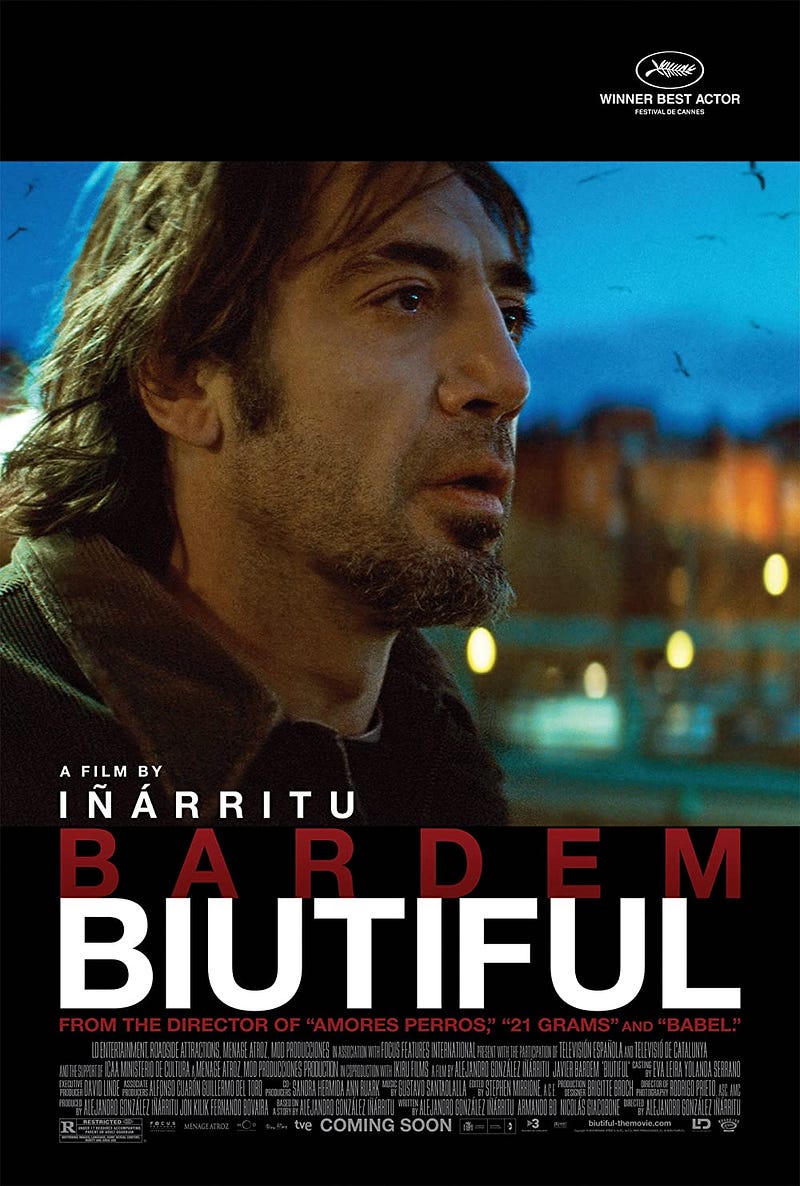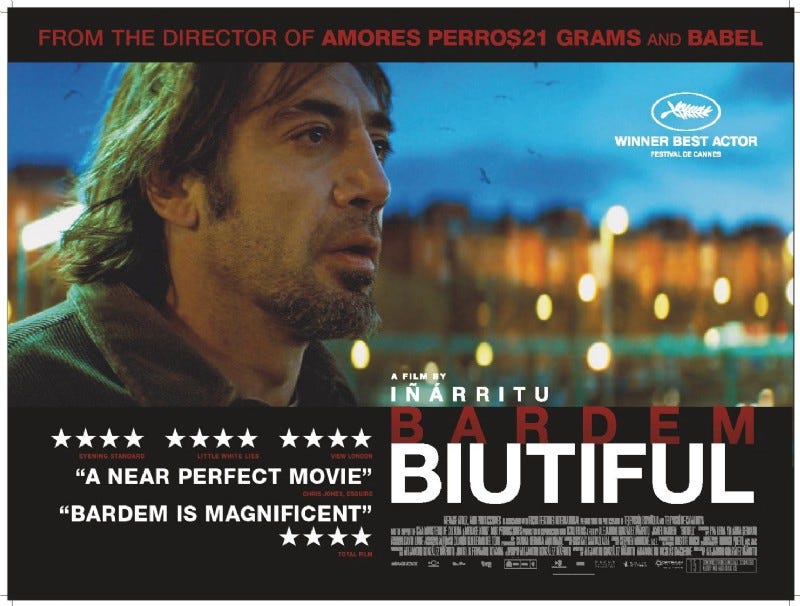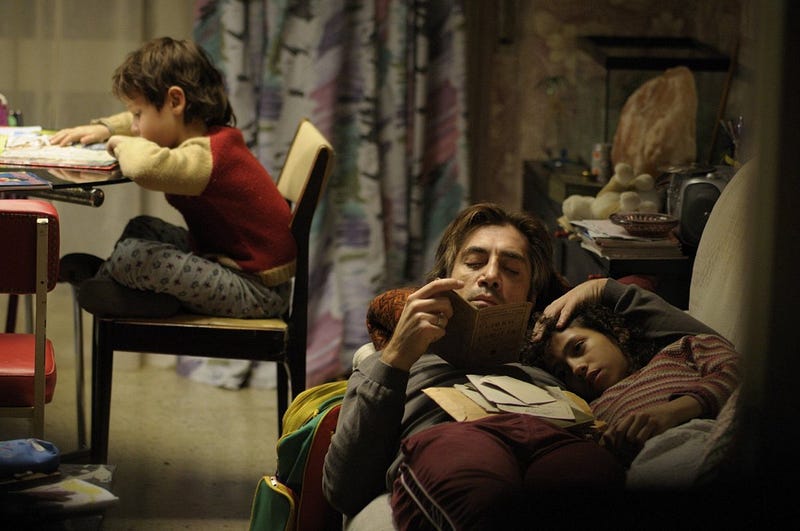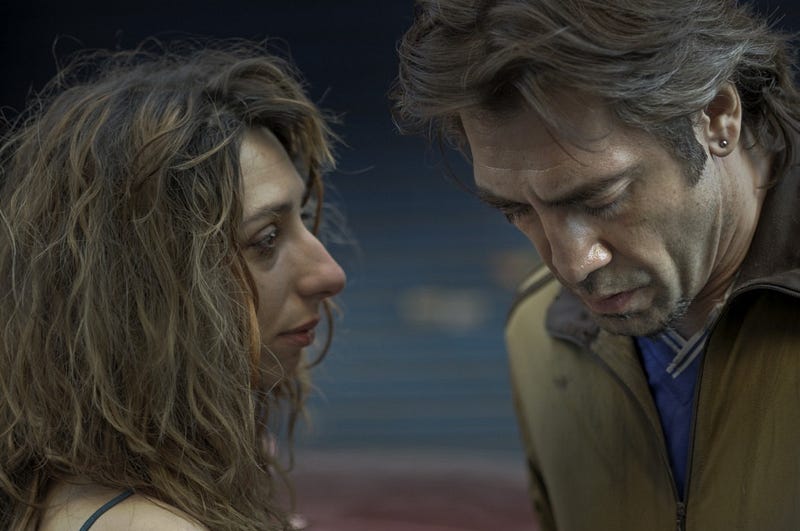“Biutiful” (2010)
Alejandro Gonzalez Inarritu and his fourth in a “Quadrilogy of Death”.
Alejandro Gonzalez Inarritu and his fourth in a “Quadrilogy of Death”.

Following the release of his “trilogy of death” films, it’s arguable that Mexican born director Alejandro Gonzalez Inarritu went a step further here with Biutiful (Beautiful) and rounded off the first decade of the new Century with a ten year quadrilogy of films all centring on the human sense of loss and desolation, grief and despair. As I detail in the blog article linked at the bottom of this brief preamble to the main event, I stumbled over Amores Perros (Love’s a Bitch) late at night and immediately tracked down a DVD copy, three years later 21 Grams was unfairly panned and if my memory serves me, 2006’s Babel also endured a similar fate. Unfairly obviously, but film appreciation or indeed criticism is entirely subjective and we all take or receive something completely different from the same film. But whilst all of these films deal in the grimness of life before an impending death, all can be uplifting and life affirming in their own twisted way.
Inarritu would leave the theme of death behind (but the real theme of his films is actually the living and experiential nature of life) with 2014’s incredible Birdman (The Unexpected Virtue of Ignorance) before having a CGI bear rip Leonardo Di Caprio to pieces in The Revenant a year later and, as I pen these words four days before the Christmas of 2022, he has finally released his 7th all time cinematic film, Bardo (False Chronicle of a Handful of Truths). I’ve yet to see Bardo but if you delve into the longer career appreciation of Inarritu linked below you’ll understand my excitement for a new film from this cinematic storyteller, thinker and provocateur.
His leading man here, Javier Bardem, would be Oscar nominated for his heart breaking portrayal before exactly a decade later being nominated again, this time for 2021’s Being The Ricardos directed by Aaron Sorkin. In the ten years between Oscar nominations, the Spanish actor would become synonymous as a James Bond villain, enter the Uber franchise worlds of Dune and Pirates of the Caribbean and, especially pleasing for me, enter the strange world of Darren Aronofsky and his ultra bizarre Mother! in 2017.
So the entire cinematic career of Alejandro Gonzalez Inarritu (2000–2015) is linked in the lengthy blog article below and I’m re-releasing stand alone articles for Amores Perros and Babel in the near future, and following this reproduction of an article I initially wrote a decade ago as I continued a 21st Century cinematic love affair with a master of the existential.
I hope you enjoy.
Alejandro Gonzalez Inarritu — Life in Six Films
Amores Perros, 21 Grams, Babel, Biutiful, Birdman and The Revenant. His entire cinematic history, all spoiler free.medium.com

“To my beautiful old oak — My Father”.
Written by the Director with Armando Bo and Nicolas Giacobone, Biutiful (Beautiful) is a Spanish language film as we follow “Uxbal” (Javier Bardem) trying to find peace with life as he comes to terms with terminal cancer. Separated from his wife “Marambra” (Maricel Alvarez) and single Father to children “Ana” (Hanaa Bouchaib) and “Mateo” (Guillermo Estrella), his work is never fully explained and spans assisting with the illegal trafficking of Chinese workers, assisting African immigrant street vendors and (not fully explained) being able to speak with the dead. All strands are shown early in the film, but neither is fully detailed and purposely left vague. Beginning and ending with the same two merged scenes, an Alejandro Gonzalez Inarritu theme of looping, non-linear narrative is again used, however this is the only occasion as the remainder of the film follows a traditional time line narrative.
Javier Bardem is truly outstanding, is in every scene and commands the screen throughout. Ably supported by Maricel Alvarez as his separated Wife, her performance of a depressed, alcohol dependant spouse is as superb as it is heart breaking. A cast of supporting actors across family/work/health support are used sparingly, but the concentration is on Bardem as we follow his physical and mental deterioration. The only minor criticism are the few minor narrative strands that are either not fully explored, or fully resolved, but the positives far outweigh this.

Quiet, melancholic and often with only minimal dialogue and “distant dialogue” at that (we hear the conversation, but in a muted way) we follow Uxbal from his decrepit Barcelona apartment, through his daily “work”, always seemingly questioning, from the profound to the basics of everyday life. He poses numerous questions “What is death?” “What is taste?” “What is sound?” against a backdrop of the humdrum nature of day to day existence. As his physical and mental health deteriorates this is depicted vividly and often distressingly so. Hallucinations on the ceiling similar to those in Trainspotting are particularly affecting. A man who doesn’t want to die, struggling to come to terms with the inevitable and unable to tell the closest to him, Bardem’s performance of stillness captures your heart with the camera so often focusing in on his eyes and facial features, it’s a heart breaking tale of loss and disconnection and of trying to make peace with all around you.

The editing, by Inarritu himself, took 14 months alone to complete and you can see why. Frenetic, fast paced during the actual scenes themselves, these often leave you unable to settle. It’s also evident as the film often cuts away from a quiet and pondering Uxbal to a fast, loud and busy vastly different scene. A tribute to his late Father, it can be ponderous and slow at times but a slow burning joy all the same. Nominated for two Oscars in 2011, and fully deserving of the nominations for Best Actor and Best Foreign Language Film.

Inarritu’s first three films were dubbed his “Trilogy of Death” but with the addition of Biutiful above, surely this is now his “Quadrilogy of Death”?
Regardless, four original astounding films that are all very difficult to watch in places and all deal in basic human raw emotions. But all four are uplifting triumphs if you allow them into your heart.
Thanks for reading. Just for larks as always, and always a human reaction rather than spoilers galore. My three most recently published film articles are linked below or there’s well over 100 blog articles (with 300+ individual film reviews) within my archives from which to choose:
“Her” (2013)
Alexa — Please show me a dystopian future.medium.com
“True Romance” (1993)
The Best of Tony Scott — Vol 1.medium.com


